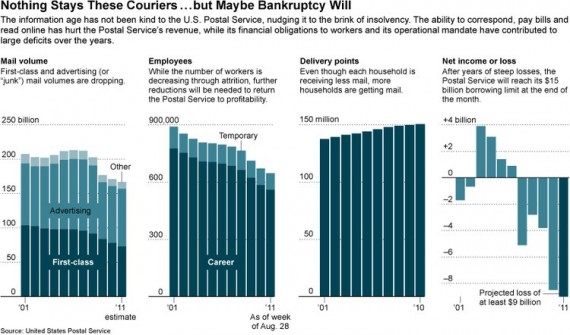Postal Service Labor Contracts Forcing Crisis
Workers account for 80% of the Postal Service budget vs. 53% at UPS and 32% at FedEx.
The post office is in dire trouble, NYT reports (“Postal Service Is Nearing Default as Losses Mount“):
The United States Postal Service has long lived on the financial edge, but it has never been as close to the precipice as it is today: the agency is so low on cash that it will not be able to make a $5.5 billion payment due this month and may have to shut down entirely this winter unless Congress takes emergency action to stabilize its finances.
[…]
“The situation is dire,” said Thomas R. Carper, the Delaware Democrat who is chairman of the Senate subcommittee that oversees the postal service. “If we do nothing, if we don’t react in a smart, appropriate way, the postal service could literally close later this year. That’s not the kind of development we need to inject into a weak, uneven economic recovery.”
Missing the $5.5 billion payment due on Sept. 30, intended to finance retirees’ future health care, won’t cause immediate disaster. But sometime early next year, the agency will run out of money to pay its employees and gas up its trucks, officials warn, forcing it to stop delivering the roughly three billion pieces of mail it handles weekly.
We all know the basic story: more efficient private carriers have taken most of the lucrative package and express delivery business, email and the Internet generally have killed First Class mail, and the requirement to treat a letter going from Atlanta to Anchorage the same as one going across town have combined to make it impossible to compete.
The post office’s problems stem from one hard reality: it is being squeezed on both revenue and costs.
As any computer user knows, the Internet revolution has led to people and businesses sending far less conventional mail.
At the same time, decades of contractual promises made to unionized workers, including no-layoff clauses, are increasing the post office’s costs. Labor represents 80 percent of the agency’s expenses, compared with 53 percent at United Parcel Service and 32 percent at FedEx, its two biggest private competitors. Postal workers also receive more generous health benefits than most other federal employees.
Emphasis mine. Those ratios can’t be sustained.
From a pure efficiency standpoint, the answer is obvious: the postal workers’ union needs to agree to some significant restructuring lest the whole enterprise collapse.
From a societal standpoint, though, that would continue a really lousy trend–a race to the bottom on salaries and benefits for workers without a college degree. Once upon a time, becoming a mail carrier meant a cushy, middle class lifestyle. In much of the country, it’s still among the better non-professional jobs to be had. (Which explains why mail service is so much better in rural Alabama than in the major metropolitan areas: the former gets the cream of the applicant pool.) Most of those paths to the middle class are being closed.
In the case of the Postal Service, we could simply decide to quit treating mail delivery as a business that ought to be “competitive” and instead consider it a service that’s vital to the infrastructure. But, aside from some very remote outposts and the recalcitrant geriatrics, that’s getting to be a harder argument to make. How much is it worth to us as a society to keep grandma from having to learn to use a computer? Or to ensure that people who live out in the middle of nowhere get cheap, daily delivery of magazines and junk mail? We’re about to find out.








I see a huge difference between “visit every address, every day,” and “visit only those addresses receiving premium deliveries.”
Of course they would have different labor ratios.
@john personna: Oh, I agree. The problem is that the postal service is both required to be a public utility and to “compete” on an unequal basis with private businesses that get to cherry pick. It’s absurd.
Remember, this is the same Obama administration that ignored existing bankruptcy laws in the GM and Chrysler bailout to make certain the union contracts were not altered in the least, while screwing over the bondholders. The Postal Unions could not have a better friend in the White House than they do right now.
There’s also that Pesky Postal Clause of the Constitution (Article I, Section 8, Clause 7 — “To establish Post Offices and post Roads.” But again, that hasn’t proven an insurmountable obstacle for the current administration.
My best guess: Obama will expend his rapidly-diminishing political capitol to bail out the Postal Service and protect the unions — but not be overly successful.
J.
@James Joyner: I think this is the one place where having the federal government as your sponsor is actually a competitive disadvantage.
J.
I have yet to see anyone suggest the other possibility: outlaw FedEx and UPS, and any other possible future competitors.
One more detail. The Bush Administration assured the Postal Service’s demise by requiring it to pay for its retirement program far in advance, driving that labor number to 80%. No corporations are required to do so nor do they– your comparisons are stilted.
http://www.apwu.org/news/webart/2011/11-006-uspsfinances-obamaletter-110113.pdf
http://www.postalnewsblog.com/2011/01/13/postal-unions-urge-obama-to-fix-usps-pension-overfunding/
James, I think you nailed it. The USPS is a government agency, not a business. Since we as a a people don’t want to give up the services it provides, we should not expect it to be profit making entity. Government is not in the business of making a profit.
I have always looked forward to opening that mailbox door and seeing what is inside, even if it is catalogs, junk advertising, etc (the more the better!). We hardly ever get a real, handwritten letter or even a card anymore, but that is okay. There is just something magical about getting something, anything!
Email, texting, etc. just isn’t the same. Give me my 6 day a week daily fix of waiting on the mail truck, watching it stop and leave something, the walk out to the mail box, and then the anticipation of seeing what is behind the door – nothing like it!
The travails of the USPS is one problem that can’t be laid at Obama’s doorstep. Congress with its competing demands regarding how the USPS operates is the second largest contributor to the postal service problems after the changes in they volume and type of mail.
Funny thing about the package business, recently I had to send several and found that the postal service was much cheaper than Fed EX or UPS for those packages and they got to the delivery point sooner. Though this may have been an anomaly.
As far as doing away with the postal service, one needs to keep in mind that “a” postal service is one of the two mandates for Congress in the Constitution, so simply turning it over to the private sector to sort out is not an option.
@Ben Wolf: The scary thing, Ben? I don’t immediately dismiss that as impossible.
J.
One thing to keep in mind is the the post office has long given job preference to vets. I can’t find any stats on the proportion of vets among the USPS workers, but it must be pretty high, especially in rural areas. Something to keep in mind whenever you hear knuckleheads complaining about lazy, overpaid postal workers.
We have to have a postal service. We can stop subsidizing junk mail, raise the cost of stamps, and so on. Would be nice if Congress would do something like hold some hearings about how to rebuild the service so it could survive. Given the typical pattern these days I would not be surprised if they sit around, watch it blow up and break down completely, and them blame the President.
By the way, does anyone know the percentage of UPS and FedEx workers who only work part time at half the wage rate that the full time employees make? Hmmmm?????
I lay much of the problem on then President Gerald Ford. When faced with a Reagan like opportunity to make a stand, Ford folded. The unions staged an illegal strike under Ford, and unlike Reagan, Ford capitulated. Postage rates have been sky rocketing ever since.
I’m not a super fan of Jaron Lanier. He’s part of the Edge hype machine, and like a lot of that crew, riding ancient and dead-end accomplishments. But, Marginal Revolution links to him, and his rambling essay does have some meat.
He talks about google’s driverless cars, and what they mean on the commercial side, and then more generally.
That kind of puts the PO question in broader historical context. Who will work when robots can deliver the mail?
Funny that a middle-class lifestyle has now become synonymous with a “cushy” lifestyle.
People like Dick Cheney and John Boehner can spend a lifetime on the Government tit, getting rich and doing untold damage to the Republic, yet it is Postal Workers who are vilified.
Does the USPS need to adapt to the times – absolutely. Adapt or die.
Do we need to continue attacking the middle-class? Only if we wish to continue destroying the country.
consider it a service that’s vital to the infrastructure?
aside from some very remote outposts and the recalcitrant geriatrics, that’s getting to be a harder argument to make
the US has 239,893,600 Internet users as of June/10, 77.3% of the population, according to ITU.
@Just nutha ig’rant cracker: In parts of the country FedEx drivers are private contractors, and all UPS and FedEx drivers work until the assigned route is complete and the truck is empty, note getting a package at 8:00 PM during Xmas rush.
@Hey Norm: We have to attack government employees, because their salary and benefits are the last thing standing in the way of transferring the entire middle class’ wealth to the top one percent. If the American people are allowed to see one segment living comfortable middle class lives, they might start to ask why they are being forced into poverty.
Fortunately the corporate-sponsored idiots in the Tea Party are working to head that off. Their all-purpose answer is: “Why are these people allowed to have a decent existence when you are not — they must be driven into poverty, too!”
james:
One of the political ironies here is that rural areas, which are a disproportionate burden on the Postal Service, also tend to be disproportionately Republican. So these are people who want to cut the federal budget while also hanging onto their heavily subsidized mail delivery.
It’s similar to the pattern we see when we notice that federal taxes paid in blue states subsidize federal spending in red states.
Obama will be responsible for the decisions he makes on the postal service good or bad!
The post office does not get tax $, it’s $ comes from selling stamps. yet it is a government service.
How much of the budget goes to wages in govt. services. police, fire, schools, transportion authority.
The post office has been mandated to pay more into federal funds than what it uses: retirement, healthcare, worker’s comp. the post office is supporting other govt. agencies.
The post office is mandated not to make a profit. there is a history of when the post office has made a profit the $ was taken to fund the govt.
Having the US Postal Service around for a measly $7 billion a year seems like a bargain to me.
@ponce: let’s put this in perspective – that’s one month in Iraq and Afghanistan and what are we getting out of those places – jack shit – and before you say those places are temporary – we are going to be paying for them for a great long time in terms of paying contractors to be there and everyone else once we pull troops out and it doesn’t look like we are pulling troops out anytime soon.
At least the USPS provides a service to the US.
I’m a fan of the USPS.
Let’s scrap the $800 billion/year U.S. military, use its equipment to arm the 500,000 postal workers, refit all mail trucks to carry a 50 caliber machine gun or a rocket launcher…and have them defend America from invasion in addition to delivering the mail.
@ponce: I was just talking about the $6-7 billion a year the USPS needs that we are spending in Afghan/Iraq but I think you are on to something, after all, those postal workers are already a good shot and many already have a mean disposition.
By weight, the vast majority of my mail is paper which will never be read and/or used for anything. It goes straight from the mailbox to the recycling bin. Doesn’t this waste bother anyone? Maybe those who like the postal service “just the way it is” are also advocates of profligate waste. And the vast majority of true communication which is useful to me is also easily accessible online. It can be delivered without the use of a Postal truck and gasoline. And I am in the process of converting my subscriptions to periodicals to online content that can be delivered to me anywhere I might be. The truth is, for many of us, there is nothing that is delivered to our mailboxes that cannot be delivered much more cheaply and efficiently by some other means.
This is not a reflection of Postal employee work habits, wages or benefits. It is simply a reflection that times are changing.
One service the Post Office might consider, however, is discarding the trash they now deliver daily without cluttering my postbox and recycle bin.
I fall under the category of “The USPS is a good deal even operating at a loss.”
But then, since I live in a rural beneficiary state, I have to support all government spending otherwise I am a vicious hypocritical welfare queen.
More seriously, I think that one of the main reasons for a higher percentage of funds going towards personnel for the USPS compared to the others has a lot to do with their mission. If I recall, USPS pay isn’t out of line with FedEx and UPS. It just costs a lot of money to go door to door.
The main concern I have with the USPS is that I am increasingly of the mind that they need to scale back operations (to roughly three days a week). That’s where I wonder if the unions come into play, because that would mean layoffs. However, I know that other things, such as postal locations and such, have more congressional obstacles. So that could be the obstacle there, too.
@mrdon: It would be a sad day for me not to have the daily joy of walking to the mailbox and seeing what I got in the mail. I love the catalogs, advertisements, coupons, and magazines. I just can’t bear to think of doing without it.
It’s not going to be pretty. My elderly parents are not online. They never will be. They live in rural New Mexico where their post office (and the one I use) is scheduled to be closed.
You want to see a revolution? It has begun, trust me. I can’t get over the far right arrogance that people don’t need magazines, mail, their bills, letters from family, packages, and other things that the USPS offers. I gather people who aren’t online and live in remote parts of the country are not as important as those who live in cities and do everything online.
While I have streamlined the process with my parents, and do their bills on line, etc. they look forward to the mail. What is wrong with allowing people to receive that – well – shall we say – RIGHT?
I have a feeling this is going to become the great American divide. I don’t think it is going to be based in party, ideology, or economic status. It is not going to be pretty.
I may order things online, but I read the catalogues I receive. Do you realize the number of businesses that will go under if the USPS goes down? Want to destroy the GOP?
SJR
The Pink Flamingo
@Trumwill:
The USPO has already been shrinking down, closing rural post offices, some that were even considered ‘historical,’ as far as years in operation. However, I think the latest articles on their plight shows that they have run out of doable options. And, I do think you may have a point about the Unions objecting to scaling back too much, either in locations or days of service, as it would directly impact their member’s jobs.
@SJ Reidhead:
Huh?
….and, where are you getting that this is the fault of the far right? From what I’ve read the USPO is on the brink of default, and are fishing for ideas/help. Has it been denied by anyone? Or, has there been a bill posted somewhere supporting more funding?
Why does the USPS have such an absurd rates schedule?
Does it really cost the same to transport a letter from Alaska to Alabama as across town?
Wouldn’t it be in everyoneks interest to raise rates to sustainable levels?
I am in the camp of viewing mail delivery as a valuable service, but if we insist on treating it as a business we will need to pay realistic rates.
If USPS were to vanish I wonder what the free market would charge for those same services. Not a penny less I would bet.
One of the things people seem to mention a lot is that it costs the same to mail a letter down the street as it does across the country. However, within the continental US, we’re not talking about an order of magnitude in difference of cost. UPS charges $12 to ground-send a 2lb package from Atlanta to Charlotte, $14 to send it to Seattle, and $17 to BFE in the mountain west where I live. That’s certainly an uptick, but variable pricing might open up more trouble than it would save, at least when we’re talking about letters and such. There is a value in knowing that sending a letter will cost x-cents without having to look up where you are, where you are sending it to, and some chart of prices.
The biggest cost of from-anywhere-to-anywhere is having the infrastructure in place. Which the USPS already has. From there, you already have trucks and the like going from everywhere to everywhere. Envelopes don’t take up much space and if you have all the trucks from from point to point anyway, it’s all about the fixed costs rather than the marginal costs. Tinkering with pricing, as far as letters go, strikes me as problematic. The USPS already does some tinkering on pricing for parcel shipments.
@WR: It might have something to do with that we, the taxpayers, are the people paying the unions. Since it’s our money, it’s our responsibility to keep our expenses down.
Now that I’ve once again introduced reality to you, that’s your cue to go postal.
Don’t disappoint me.
J.
The Post Office runs out of money just before Christmas.
I would love to see the Republican freaks in Congress let the Post Office close the week before Christmas.
The Post Office is truly an amazing operation. I now get mail forwarded from the US to China. What is the cheapest, fastest and most reliable way to do this? USPS. By far.
James, you didn’t deal with two extremely important issues. You take it as a given that the main problem is the 80% labor costs, but neglected to take into account, or respond to, the fact that by law they must fund 100% of their pension costs upfront, which contributes very significantly to their labor costs. Is this a good or bad thing? I think its good and I would be happy to see it applied universally across their competitors. But at this moment it is not.
The second point, which you don’t fairly address, is that there is another solution: the Post Office could raise prices. Once again, the Republican Party( a.k.a the party run by people from the States with the poorest infrastructure and services) is holding the USPS hostage to its fairy-tale view of the world. The Republican answer to everything is to drive down the living standards of the middle class. But only in fantasy land is that the only answer. Why do we look to the party of the US South, perennially ranked at the bottom in performance of every government metric, to “guide” us to prosperity. Do you really want to send your kid to a Mississippi school rather than a CT one? Do you really want an Alabama environmental agency checking to maker sure your drinking water is safe rather than one from New York?
You are right James, the world is changing for the Post Office. They will not be able to spread the cost of universal delivery over the volume they had in the past. One answer would be to “Southernize” the USPS, i.e. wreck it and leave it as a former shell of itself, then point it out as an example of how government can’t accomplish anything. But I, for one, am tired of the Republicans, the party of the South, ruining the rest of the country.
These statistics require a better presentation than a quick partisan snippet. Is it true what someone said about the pensions? Is this a “legacy” cost? And what evidence is presented to say postal service is better in the South than the the North- is this another preconceived notion by the author.
@Raoul: Who said the postal service is better in the South than the North?
@MarkedMan: The Post Office is truly an amazing operation. I now get mail forwarded from the US to China. What is the cheapest, fastest and most reliable way to do this? USPS. By far.
I would quibble with the “fastest and most reliable,” but I’ll let that slide. But what I will take issue with is “cheapest.”
It’s not the cheapest, it just appears to be. Because, as noted, it’s subsidized by the taxpayers. This is an example of cost-shifting; the actual price isn’t being borne by the sender or the recipient, but by all the taxpayers.
The real question is whether or not we should continue that. And I have to confess, I was a stalwart “let them suck it up” kind of guy — until this thread. Now, I’m feeling a bit more lenient. I’d go along with subsidizing it, but along with some union concessions.
Starting with an apology for running this commercial:
http://www.youtube.com/watch?v=lX_WasAnDcM&feature=player_embedded
Maybe some rate changes, too. I’m not about to demand that they become self-sufficient, but they gotta do something to cut the losses.
J.
@Trumwill:
In a lot of situations the management of multiple rates becomes a significant cost. It affects the whole pipeline. It becomes a burden as well as a marketing dis-incentive. I suspect that’s why FedEx went with standard pricing as well.
MM: I was extrapolating- this is what JJ said: “Which explains why mail service is so much better in rural Alabama than in the major metropolitan areas: the former gets the cream of the applicant pool.”
@Raoul: I’m not arguing that it’s regional but cost-of-living based. I never understood complaints about lousy postal service until I moved to the DC area, where it’s routine. We constantly get misdelivered mail, ruined mail, and the like. I gather the same is true in Chicago and other major metro areas.
My surmise is that this is a function of mail carriers getting essentially the same salaries everywhere, meaning they’re paid lousy wages in DC and are in the upper middle class in rural Alabama.
@Jay Tea: Really Jay? You would quibble with the “fastest and most reliable”? Based on what exactly? I think I’ll take my advice from the company that makes it’s living forwarding mail, unless you have some special insight you’ve been concealing up to now.
And how is the USPS subsidized by the tax payer? They run their own P&L.